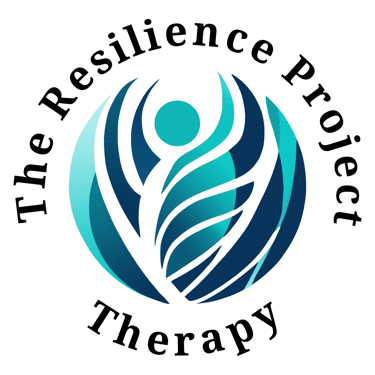What is Anxiety and How Can You Manage It?
Anxiety disorder can have a seriously impairing effect on your life, but it doesn't have to.
ANXIETY
Christian Gray Hering, LCSW
6/19/20234 min read
As a therapist, I often work with clients who struggle with anxiety. Anxiety is a common and normal emotion that everyone experiences from time to time. However, for some people, anxiety can become excessive, persistent, and interfere with their daily functioning and well-being.
In this blog post, I will explain what anxiety is, what causes it, and how you can manage it.
What is Anxiety?
Anxiety is an emotion characterized by feelings of tension, worry, nervousness, or fear about something that may or may not happen in the future. Anxiety can also cause physical symptoms such as racing heart, sweating, trembling, nausea, or difficulty breathing.
Anxiety is not the same as fear. Fear is a response to a real or perceived immediate threat, whereas anxiety is more anticipatory and vague¹. For example, you may feel fear when you see a snake in front of you, but you may feel anxiety when you think about giving a presentation next week.
Anxiety can be adaptive or maladaptive. Adaptive anxiety is a healthy and appropriate reaction to a stressful or challenging situation. It can motivate you to prepare, perform, or protect yourself. For example, you may feel anxious before an exam or a job interview, but this can help you study harder or prepare better.
Maladaptive anxiety is excessive or inappropriate to the situation. It can impair your functioning, cause distress, or prevent you from doing what you want or need to do. For example, you may feel so anxious about flying that you avoid traveling altogether.
There are different types of anxiety disorders that are characterized by different patterns of symptoms and triggers. Some of the most common anxiety disorders are:
Generalized anxiety disorder (GAD): A condition where you experience excessive and uncontrollable worry about various aspects of your life, such as health, work, family, or finances. You may also have physical symptoms such as restlessness, fatigue, muscle tension, irritability, or insomnia².
Panic disorder: A condition where you experience recurrent and unexpected panic attacks. A panic attack is a sudden surge of intense fear and discomfort that peaks within minutes and causes symptoms such as palpitations, chest pain, shortness of breath, dizziness, or fear of dying or losing control³.
Phobias: A condition where you have an irrational and excessive fear of a specific object or situation that triggers anxiety or panic. You may also avoid or endure the feared object or situation with extreme distress. Some common phobias are agoraphobia (fear of open or crowded places), social phobia (fear of social situations), and other specific phobias (fear of animals, heights, blood, etc.)⁴.
Obsessive-compulsive disorder (OCD): A condition where you have recurrent and intrusive thoughts (obsessions) that cause anxiety and repetitive behaviors (compulsions) that you feel compelled to perform to reduce the anxiety. For example, you may have obsessive thoughts about germs and compulsive behaviors of washing your hands repeatedly⁵.
Post-traumatic stress disorder (PTSD): A condition where you have persistent and distressing symptoms after experiencing or witnessing a traumatic event that involved actual or threatened death, injury, or violence. You may have symptoms such as flashbacks, nightmares, avoidance, hypervigilance, or negative mood.
What Causes Anxiety?
There is no single cause of anxiety, but it can be influenced by a combination of biological, psychological, and environmental factors. Some of the possible causes of anxiety are:
Genetics: You may inherit a tendency to be more anxious or prone to developing anxiety disorders from your parents or relatives.
Brain chemistry: You may have imbalances in certain neurotransmitters, such as serotonin and norepinephrine, that regulate mood and stress response.
Personality: You may have personality traits that make you more vulnerable to anxiety, such as neuroticism, perfectionism, or low self-esteem.
Life experiences: You may experience stressful or traumatic events that trigger or worsen your anxiety, such as abuse, loss, illness, or conflict.
Cognitive factors: You may have distorted or irrational beliefs that fuel your anxiety, such as overestimating the likelihood or severity of a threat, catastrophizing the consequences of a situation, or misinterpreting bodily sensations as signs of danger.
How Can You Manage Anxiety?
Anxiety can be managed with various strategies that target different aspects of the problem. Some of the most effective ways to manage anxiety are:
Seeking professional help: The best treatment for anxiety disorders is cognitive-behavioral therapy (CBT), which is a type of psychotherapy that helps you identify and change the negative thoughts and behaviors that cause and maintain your anxiety. CBT can also teach you relaxation techniques, such as deep breathing, progressive muscle relaxation, or mindfulness meditation, that can help you calm your body and mind during an anxious episode. In some cases, medication may also be prescribed to help reduce the symptoms of anxiety.
Educate yourself: Learning more about anxiety can help you understand what it is and why it happens. It can also help you recognize the signs and symptoms of anxiety and reassure yourself that they are not harmful or dangerous. You can find reliable information about anxiety online, in books, or from your therapist.
Challenge your thoughts: When you are anxious, you may have irrational or exaggerated thoughts that increase your fear and worry. For example, you may think that you are having a heart attack, that you are going crazy, or that something terrible will happen if you make a mistake. These thoughts are not based on reality and only make your anxiety worse. You can challenge these thoughts by asking yourself questions such as: What is the evidence for this thought? Is there another way to look at this situation? What is the worst that could happen? How likely is it to happen? What can I do to cope if it does happen?
Use coping skills: Coping skills are positive actions that can help you reduce your anxiety and improve your mood. For example, exercise regularly, eat well-balanced meals, get enough sleep, engage in enjoyable activities such as hobbies and volunteering, and seek support from friends, family, professional counselors, and support groups.
Last Thoughts
Though anxiety is normal, for some it can be debilitating and life-altering. I encourage you to try some of the methods mentioned above to manage your anxiety and see how they make you feel. You may notice positive changes in your mental health over time. If the tools mentioned are not providing relief, please seek the advice of a qualified therapist who can provide you with the appropriate treatment and support.
I hope this blog post has helped you understand what anxiety is and how to cope with it. I wish you all the best on your journey of healing and growth.
(1) Anxiety disorders - Symptoms and causes - Mayo Clinic. https://www.mayoclinic.org/diseases-conditions/anxiety/symptoms-causes/syc-20350961.
(2) Anxiety - American Psychological Association (APA). https://www.apa.org/topics/anxiety/.
(3) Anxiety: Symptoms, types, causes, prevention, and treatment. https://www.medicalnewstoday.com/articles/323454.
(4) The Causes of Anxiety | Psychology Today. https://www.psychologytoday.com/us/basics/anxiety/the-causes-anxiety.
(5) Anxiety - Every Mind Matters - NHS. https://www.nhs.uk/every-mind-matters/mental-health-issues/anxiety/.
The Resilience Project Therapy
Mailing
P.O. Box 832182
Richardson, TX 75083
Contacts








